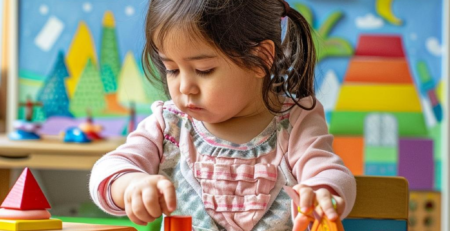
19
Ultimate Guide to Becoming a Montessori Teacher: Qualifications, Training, and Career Opportunities
Have you ever considered becoming a Montessori teacher and guiding young minds through the unique and innovative educational approach developed by Maria Montessori? If so, you’ve come to the right place. In this article, we will explore the steps and requirements to become a Montessori teacher, and provide you with valuable insights and tips on how to embark on this fulfilling and rewarding career path. Whether you’re a seasoned educator looking to transition into the Montessori method, or a passionate individual with a love for children and education, this article will serve as a valuable guide to help you achieve your goal of becoming a Montessori teacher.
Table of Contents
- Education and Training Requirements
- Understanding the Montessori Philosophy
- Developing Practical Skills and Experience
- Gaining Certification and Licensure
- Finding Employment Opportunities
- Continuing Professional Development
- Q&A
- In Conclusion
Education and Training Requirements
For those interested in becoming a Montessori teacher, there are specific that must be met. While the exact requirements can vary depending on the specific school or organization, there are some common steps to follow in order to become a certified Montessori teacher.
Educational Background: Most Montessori teacher training programs require candidates to have at least a high school diploma or equivalent. A bachelor’s degree in education or a related field is often preferred, but not always required. Some programs may also require additional coursework in child development, psychology, or other related subjects.
Montessori Teacher Training: In addition to a formal education, aspiring Montessori teachers must complete a recognized Montessori teacher training program. These programs typically involve a combination of coursework and hands-on practice in a Montessori classroom. Upon completion, graduates are awarded a certificate or diploma, which is often a prerequisite for obtaining employment as a Montessori teacher.
Understanding the Montessori Philosophy
Montessori education is a unique approach to teaching and learning that focuses on the holistic development of children. It is based on the principles developed by Dr. Maria Montessori, an Italian physician and educator, who believed that children have an innate desire to learn and explore the world around them. The Montessori philosophy emphasizes the importance of self-directed learning, individualized instruction, and hands-on, experiential learning.
When it comes to becoming a Montessori teacher, it’s important to have a deep understanding of the Montessori philosophy and approach to education. This includes a focus on promoting independence, fostering self-discipline, and creating a prepared environment that encourages exploration and discovery. Montessori teachers are trained to observe and guide children in their learning journey, rather than imparting knowledge through traditional lectures and rote memorization. By embracing the Montessori philosophy, teachers can help children develop a lifelong love of learning and a strong sense of self-confidence and independence.
Developing Practical Skills and Experience
When it comes to becoming a Montessori teacher, practical skills and experience are essential. Montessori education focuses on hands-on, experiential learning, and as a teacher, it’s important to embody these principles. To develop practical skills, consider the following:
- Observation: Spend time observing experienced Montessori teachers in action. Take note of their teaching methods, classroom management style, and how they engage with students.
- Hands-on Practice: Seek opportunities to work with children in a Montessori environment. This could be through volunteer work, internships, or part-time positions at Montessori schools or daycare centers.
- Professional Development: Attend workshops, seminars, and training programs specifically focused on Montessori education. These can provide valuable insights and practical strategies for effective teaching.
In addition to developing practical skills, gaining experience as a Montessori teacher is crucial. Here are some ways to build your experience in the field:
- Student Teaching: Consider completing a student teaching placement in a Montessori classroom. This will allow you to apply your learning in a real-world setting under the guidance of a mentor teacher.
- Substitute Teaching: Gain experience by working as a substitute teacher in Montessori schools. This will give you exposure to different age groups and teaching styles.
- Networking: Connect with other Montessori professionals, join professional organizations, and attend networking events to expand your connections and learn from others in the field.
Gaining Certification and Licensure
One of the first steps in becoming a Montessori teacher is to gain the necessary certification and licensure. This process involves completing a Montessori teacher training program that is accredited by the Association Montessori Internationale (AMI) or the American Montessori Society (AMS). These programs typically include coursework in child development, Montessori philosophy, and classroom management, as well as supervised practical experience in a Montessori classroom.
Once you have completed your Montessori teacher training program, you will need to obtain certification from either the AMI or AMS. This certification demonstrates that you have met the standards set by these organizations and are qualified to teach in Montessori schools. In addition to certification, some states and countries may also require Montessori teachers to obtain a teaching license. This process typically involves submitting an application, providing proof of your education and training, and passing a background check.
Finding Employment Opportunities
Are you passionate about teaching and interested in the Montessori approach to education? Becoming a Montessori teacher can be a fulfilling career choice. However, finding employment opportunities in this field can be challenging. Here are some tips to help you navigate the job market and land your dream job as a Montessori teacher.
1. Research Montessori Schools: Start by researching Montessori schools in your area. Look for schools that align with your values and teaching philosophy. Visit their websites and familiarize yourself with their programs and educational approach.
2. Network with Montessori Educators: Connect with current Montessori educators in your community. Attend local Montessori events, workshops, and conferences to network with professionals in the field. Building relationships with experienced educators can open doors to job opportunities.
3. Obtain Montessori Certification: To be competitive in the job market, consider obtaining a Montessori teaching certification. Many Montessori schools require teachers to have completed a certified Montessori training program. Investing in this certification can increase your chances of securing a teaching position.
| Tip: | Consider volunteering at a Montessori school to gain practical experience and make valuable connections. |
Continuing Professional Development
- Earn a Bachelor’s Degree: Start by obtaining a bachelor’s degree in education or a related field. This will provide you with a solid foundation for understanding educational principles and child development.
- Complete Montessori Training: Enroll in a Montessori teacher training program accredited by the Montessori Accreditation Council for Teacher Education (MACTE). This specialized training will equip you with the knowledge and skills needed to implement the Montessori method effectively.
- Gain Practical Experience: Seek opportunities to gain practical experience in a Montessori classroom. This could be through internships, volunteer work, or assistant teaching positions. Practical experience is invaluable in honing your teaching abilities.
| Pros | Cons |
|---|---|
| High demand for Montessori teachers | Specialized training required |
| Rewarding and fulfilling career | May require ongoing professional development |
By following these steps and continually investing in your professional development, you can become a competent and effective Montessori teacher, positively impacting the lives of young learners.
Q&A
Q: What is the role of a Montessori teacher?
A: A Montessori teacher’s role is to guide and support children in their individual learning journeys, create a prepared environment that fosters independence and self-directed learning, and facilitate the development of social and emotional skills.
Q: What are the qualifications needed to become a Montessori teacher?
A: To become a Montessori teacher, one typically needs to complete a Montessori teacher education program accredited by the Association Montessori Internationale (AMI) or the American Montessori Society (AMS). Additionally, a bachelor’s degree in education or a related field may be required.
Q: What skills are important for a Montessori teacher to possess?
A: A Montessori teacher should have excellent communication and interpersonal skills, a deep understanding of child development and the Montessori method, as well as patience, creativity, and adaptability.
Q: Is it necessary to have prior teaching experience to become a Montessori teacher?
A: While prior teaching experience can be beneficial, it is not always required to become a Montessori teacher. However, having a passion for working with children and a willingness to learn and grow as an educator are essential.
Q: What is the Montessori teacher education program like?
A: A Montessori teacher education program typically includes a combination of classroom instruction, observation of experienced Montessori teachers, and supervised practice teaching in a Montessori environment. The program focuses on the principles and practices of the Montessori method, as well as child development and curriculum planning.
Q: How can one gain hands-on experience as a Montessori teacher?
A: Gaining hands-on experience as a Montessori teacher can be achieved by completing a practicum as part of a Montessori teacher education program, volunteering at a Montessori school, or seeking employment as a classroom assistant or substitute teacher in a Montessori environment.
In Conclusion
Becoming a Montessori teacher is a challenging yet rewarding journey that requires patience, dedication, and a genuine passion for educating young minds. By embracing the Montessori method and undergoing the necessary training, you can become a teacher who fosters independence, creativity, and a lifelong love of learning in your students. So, whether you are just starting out on this path or are already on your way, remember to stay open-minded, adaptable, and committed to continual growth and learning. With the right mindset and a steadfast commitment to the Montessori philosophy, you can become the kind of teacher who truly makes a difference in the lives of your students. Good luck on your journey!










